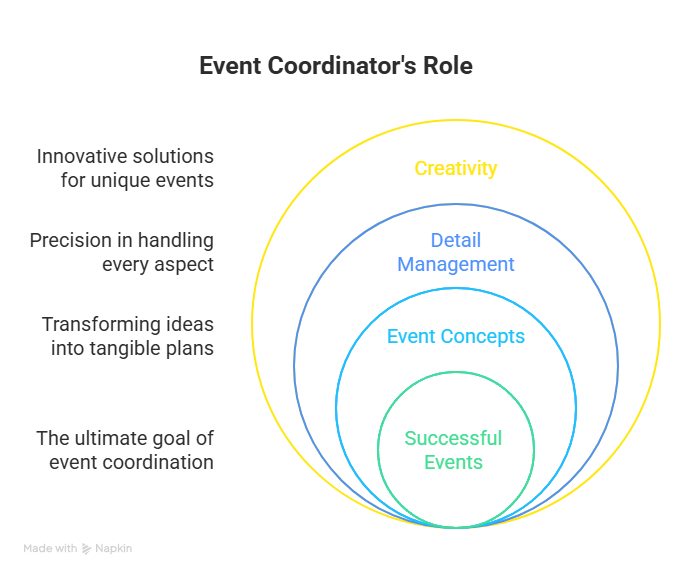An event coordinator is a professional who plans, manages, and executes various types of events, ensuring smooth operations and memorable experiences for clients and attendees.
Key Takeaways:
- Versatile role across multiple event types
- Critical skills include communication and organization
- Technology-driven event management
- Continuous learning is essential
Understanding the Event Coordinator Role
Event coordinators are the masterminds behind successful gatherings, from intimate weddings to large corporate conferences. Their primary mission is to transform event concepts into reality, managing every detail with precision and creativity.

Types of Events Managed
- Corporate events
- Personal celebrations
- Large-scale productions
- Festivals
- Conferences
- Concerts
- Company picnics
Core Responsibilities
Strategic Planning
Event coordinators develop comprehensive strategies that cover:
- Timeline management
- Vendor coordination
- Budget control
- Guest list oversight
- On-site problem resolution
Venue Flexibility
Professionals can organize events in diverse locations:
- Hotels
- Hospitals
- Pubs
- Cruise ships
- Parks
- Event venues
- Aircraft
Essential Skills for Success
Professional Capabilities
- Communication: Crystal-clear interaction with clients and vendors
- Organization: Meticulous planning and detail tracking
- Budget Management: Financial control and cost optimization
- Technical Proficiency: Using event management software
- Crisis Management: Quick problem-solving abilities
Technology and Tools
Industry-Standard Software
- Cvent: Comprehensive event management platform
- Social Tables: Floor plan and seating design
- Eventbrite: Digital registration and ticketing
Professional Certifications
Recommended Credentials
- Certified Meeting Professional (CMP)
- Certified Special Events Professional (CSEP)
Budgeting Strategies
Financial Management Techniques
- Cost-per-attendee calculations
- Vendor discount negotiations
- 10-15% contingency fund allocation
- Risk mitigation planning
Sustainability Practices
Modern Event Considerations
- Waste reduction techniques
- Local vendor prioritization
- Digital engagement alternatives
- Eco-friendly event design
Crisis Management
Emergency Preparedness
- Develop clear emergency protocols
- Create weather contingency plans
- Maintain backup vendor networks
- Implement rapid response strategies
Measuring Success
Performance Metrics
- Attendee satisfaction scores
- Return on investment calculations
- Social media engagement tracking
- Post-event evaluation frameworks
Career Development
Professional Growth Strategies
- Network through industry associations
- Pursue continuous learning
- Stay updated on emerging trends
- Build a comprehensive portfolio
Conclusion
Event coordination is a dynamic, challenging, and rewarding profession requiring creativity, technical skills, and exceptional organizational abilities.
Investment and Earnings
Average event coordinator salaries in South Africa range from R180,000 to R450,000 annually, depending on experience and event complexity.
Recommended Resources
Pro Tip: Always have a backup plan and maintain excellent communication with all stakeholders!


